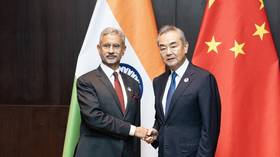India won’t shift stance on Chinese investment – minister
A policy document earlier suggested that New Delhi should opt for more direct investment from Beijing to bolster its own exports to the US and other markets
India is not “rethinking” its stand against foreign direct investment (FDI) from China, Commerce Minister Piyush Goyal said on Tuesday. Goyal’s statement came days after the release of the country’s annual Economic Survey, which advocated attracting investment from Chinese companies to increase Indian exports.
“To boost Indian manufacturing and plug India into the global supply chain, it is inevitable that India plugs itself into China’s supply chain,” the survey stated. It added that New Delhi would have to make a choice whether to do so “by relying solely on imports or partially through Chinese investment.”
According to the annual report, which assesses the state of the Indian economy and sets the tone for policymaking, focusing on FDI from China could also boost Indian exports to the US in a similar way to how East Asian economies, including South Korea, Taiwan, Thailand, Singapore, Malaysia, and Indonesia, have done so in the past.
“As the US and Europe shift their immediate sourcing away from China, it is more effective to have Chinese companies invest in India and then export the products to these markets rather than importing from China,” the report noted.
Goyal, however, clarified that the survey is not a “binding” document and that there would be no change in India’s current policy on attracting Chinese investment, the PTI news agency reported.
The policy was updated in 2020 after ties between the two Asian powers nosedived following a deadly clash between their armies along the Line of Actual Control, a disputed border running through the Himalayan region. Following a skirmish in the Galwan Valley, India banned over 200 Chinese mobile apps such as TikTok, WeChat, and Alibaba’s UC browser.
“There is no rethinking at present to support Chinese investments in the country,” Goyal told reporters in New Delhi.
Since 2020, the Prime Minister Narendra Modi-led government made its approval mandatory for FDI from countries that share a land border with India. China currently ranks only 22nd among sources of direct foreign investment to India, with a 0.37% share ($2.5 billion) in the total FDI equity inflow reported from April 2000 to March 2024, the report noted.
At the same time, bilateral trade between New Delhi and Beijing continues to expand. China emerged as India’s top trading partner in the last fiscal year, with two-way trade reaching $118.4 billion. Earlier this year, India’s Competition Commission cleared a proposal by major domestic conglomerate JSW Group to acquire a 38% stake in MG Motor India, a wholly owned subsidiary of Shanghai-headquartered SAIC Motor, which manufactures passenger cars under the ‘MG’ brand.
In recent months, New Delhi and Beijing have expressed willingness to stabilize ties. Last week, Chinese Foreign Minister Wang Yi met with his Indian counterpart, Subrahmanyam Jaishankar, on the sidelines of the Association of Southeast Asian Nations (ASEAN) foreign ministers’ meeting in Laos. “It is hoped that China and India will work in the same direction and explore how the neighboring countries can get along,” Yi said, according to the Chinese readout.
Jaishankar insisted that New Delhi would focus on finding solutions to its border disputes with China and Pakistan shortly after Modi was elected as prime minister for a third consecutive term this year. In an interview with Newsweek earlier this year, Modi noted that for India, the relationship with China is significant. “It is my belief that we need to urgently address the prolonged situation on our borders so that the abnormality in our bilateral interactions can be put behind us,” he said.
Where India Meets Russia: Follow and share RT India on X and Instagram
You can share this story on social media:









Comments are closed.